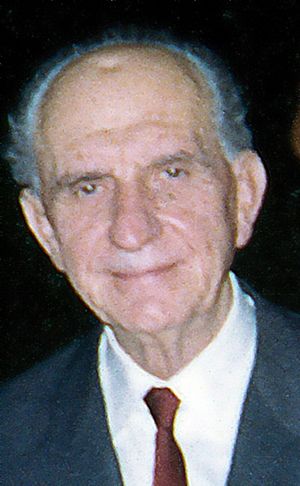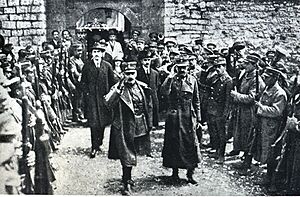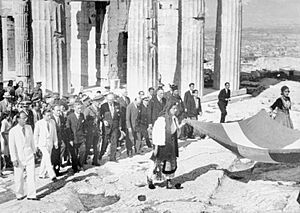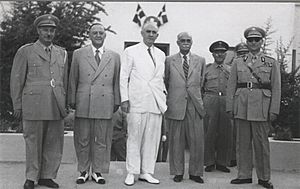Georgios Papandreou facts for kids
Quick facts for kids
Georgios Papandreou
Γεώργιος Παπανδρέου |
|
|---|---|

Georgios Papandreou
|
|
| Prime Minister of Greece | |
| In office 19 February 1964 – 15 July 1965 |
|
| Monarch | Paul Constantine II |
| Preceded by | Ioannis Paraskevopoulos |
| Succeeded by | Georgios Athanasiadis-Novas |
| In office 8 November 1963 – 30 December 1963 |
|
| Monarch | Paul |
| Preceded by | Stylianos Mavromichalis |
| Succeeded by | Ioannis Paraskevopoulos |
| In office 26 April 1944 – 3 January 1945 |
|
| Monarch | George II |
| Preceded by | Sofoklis Venizelos |
| Succeeded by | Nikolaos Plastiras |
| Deputy Prime Minister of Greece | |
| In office 28 August 1950 – 4 July 1951 |
|
| Prime Minister | Sofoklis Venizelos |
| Preceded by | himself |
| Succeeded by | Emmanouil Tsouderos |
| In office 15 April 1950 – 21 August 1950 |
|
| Prime Minister | Nikolaos Plastiras |
| Preceded by | Panagiotis Kanellopoulos |
| Succeeded by | himself |
| Minister of Education | |
| In office 18 February 1964 – 15 July 1965 |
|
| Prime Minister | himself |
| Preceded by | Georgios Kourmoulis |
| Succeeded by | Georgios Athanasiadis-Novas |
| In office 8 November 1963 – 30 December 1963 |
|
| Prime Minister | himself |
| Preceded by | Ioannis Sountis |
| Succeeded by | Georgios Kourmoulis |
| In office 1 February 1951 – 4 July 1951 |
|
| Prime Minister | Sofoklis Venizelos |
| Preceded by | Nicholas Bakopoulos |
| Succeeded by | Nicholas Bakopoulos |
| In office 16 January 1933 – 6 March 1933 |
|
| Prime Minister | Eleftherios Venizelos |
| Preceded by | Dimitrios Chatziskos |
| Succeeded by | Alexandros Mazarakis-Ainian |
| In office 2 January 1930 – 26 May 1932 |
|
| Prime Minister | Eleftherios Venizelos |
| Preceded by | Konstantinos Gontikas |
| Succeeded by | Pericles Karapanos |
| Personal details | |
| Born | 13 February 1888 Kalentzi, Achaea, Greece |
| Died | 1 November 1968 (aged 80) Athens, Greece |
| Political party | Centre Union |
| Spouses | Sofia Mineyko Cybele Andrianou |
| Children | Andreas Papandreou Georgios G. Papandreou |
| Signature | |
Georgios Papandreou (Greek: Γεώργιος Παπανδρέου Geórgios Papandréou; 13 February 1888 – 1 November 1968) was an important Greek politician. He is known for starting the Papandreou political dynasty, a family with many famous politicians. He served as Prime Minister of Greece three times: from 1944 to 1945, in 1963, and from 1964 to 1965. He was also Deputy Prime Minister from 1950 to 1952. Throughout his long career, which lasted over 50 years, he held many different government jobs starting in 1923.
Contents
Early Life and Education
Georgios Papandreou was born in a place called Kalentzi, in the Achaea region of Greece. His father, Andreas Stavropoulos, was an Orthodox priest. His last name, Papandreou, comes from his father's name and the Greek word papas, meaning "priest."
He studied law in Athens, Greece, and political science in Berlin, Germany. His ideas about politics were greatly shaped by German social democracy. This meant he believed in strong social programs to help people. He was also against the idea of a king ruling the country. However, he was very much against communism in Greece.
As a young man, he supported a leader named Eleftherios Venizelos. Venizelos made him the governor of Chios after the Balkan Wars. Georgios Papandreou married twice. His first wife was Sofia Mineyko, and they had a son named Andreas Papandreou. His second wife was the actress Cybele Andrianou, and they had a son named George Papandreou.
Joining the Political Scene
During the World War I, Greece faced a big political problem. Papandreou strongly supported Venizelos, who wanted Greece to join the Allies. This was against the wishes of the pro-German king, King Konstantínos I. When Venizelos left Athens, Papandreou went with him. He helped gather support for Venizelos's government in Thessaloniki.

In 1921, as a lawyer, he defended Alexandros Papanastasiou. Papanastasiou had criticized King Konstantínos. Papandreou himself was put in prison by the royalist government for an article he wrote. He called for the king to step down. He even barely escaped being killed by royalist extremists.
From 1923, he served as interior minister. He was elected to parliament for Lesbos in 1923. He also held jobs as finance minister, education minister, and transport minister. As education minister, he made big changes to the Greek school system. He built many schools for children who had become refugees after the Greco-Turkish War (1919–22).
In 1935, he started his own political group, the Democratic Socialist Party of Greece. He was sent away from the capital when a general tried to bring back the monarchy. In 1938, he was again exiled by the Greek dictator Ioannis Metaxas.
World War II and After
When Greece was occupied during World War II, Italian authorities arrested Papandreou. He later escaped to the Middle East. There, he joined the Greek government that was working from outside the country. With help from the British, King Geórgios II made him Prime Minister. Under his leadership, important meetings took place to try and unite different groups in Greece. These meetings aimed to prevent conflicts and form a national unity government.
Liberation and Challenges

After the Axis powers left Greece, Papandreou returned to Athens in October 1944. He was the Prime Minister of the Greek government-in-exile. He tried to bring peace between the different groups in Greece. He worked closely with a British general, Sir Ronald Scobie.
Even though he resigned in 1945, he continued to hold important positions. From 1946 to 1952, he was a minister for labor, supplies, education, finance, and public order. He was also Deputy Prime Minister from 1950 to 1952.
The years from 1952 to 1961 were tough for Papandreou. The liberal political groups in Greece were weak. They lost elections to conservative parties.
Leading the Centre Union
In 1961, Papandreou brought new life to Greek liberalism. He started the Centre Union Party. This party brought together old liberal supporters, social democrats, and some unhappy conservatives. After the 1961 elections, which he called unfair, Papandreou started a "Relentless Struggle" against the right-wing party and the "deep state."
His party won the elections in November 1963 and again in 1964. The 1964 election was a huge victory. As Prime Minister, his new policies were very modern. This caused a lot of disagreement among conservative groups. His son, Andreas Papandreou, also played a big role. Andreas had more left-leaning ideas than his father. He created groups to push for more progressive policies.
Papandreou was against an agreement that led to the creation of Cyprus. When fighting broke out between Greek and Turkish communities there, his government sent a Greek army division to the island.
King Constantine II openly disagreed with Papandreou's government. There were also many plots in the Army by extreme right-wing groups. These events made the government unstable. In July 1965, the King caused a split in the Centre Union party. He then dismissed Papandreou's government. This event is known as the Apostasia.
After a military coup in April 1967, led by George Papadopoulos, Papandreou was arrested. He died in November 1968 while under house arrest. His funeral became a huge protest against the military government. He is buried in the First Cemetery of Athens, next to his son Andreas.
His Lasting Impact

Papandreou was known as one of the best speakers in Greek politics. He was a strong fighter for Democracy. During the time of the military government and after his death, people lovingly called him "ο Γέρος της Δημοκρατίας" (o Géros tis Dimokratías), which means "the old man of Democracy." Today, to tell him apart from his grandson, George A. Papandreou, people often use his full first name, Georgios, for the grandfather.
Works
- The Liberation of Greece, Athens, 1945
Awards and Honors
In 1965, the University of Belgrade gave him an honorary doctorate. This is a special award given to someone for their achievements.
See also
- Andreas Papandreou, his son
- George Papandreou, his grandson
 In Spanish: Yorgos Papandréu (1888-1968) para niños
In Spanish: Yorgos Papandréu (1888-1968) para niños
 | Precious Adams |
 | Lauren Anderson |
 | Janet Collins |

